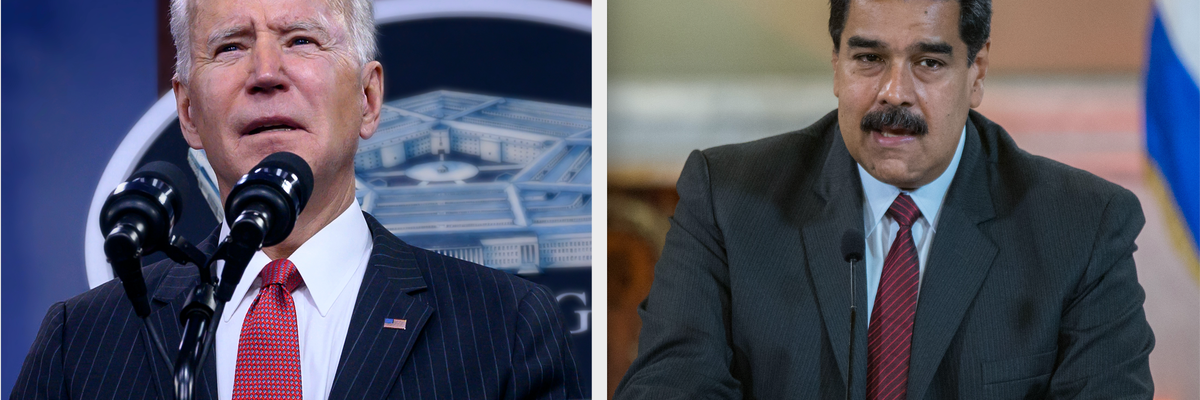With a razor-thin Senate majority and midterms fast approaching, it will be tempting for President Biden to play it safe on Venezuela policy — to maintain punishing sectoral sanctions without matching offers of relief to concessions, and to avoid using political capital in support of negotiations between the Maduro regime and the opposition. But while this logic seems to sell in Washington, it has failed the Venezuelan people.
As Biden himself has noted, one of the biggest missteps of former President Trump’s Venezuela policy was to approach the issue as part of an electoral strategy in South Florida rather than a complex crisis that requires an innovative diplomatic strategy. “The Trump administration,” Biden told the Council of Foreign Relations in August 2019, “appears more interested in using the Venezuelan crisis to rally domestic political support than in seeking practical ways to effect democratic change in Venezuela.”
So far there have been some signs that Biden wants to avoid Trump’s mistake. Senior foreign policy staff have expressed clear interest in taking Venezuela policy in a new direction. Juan Gonzalez, the National Security Council’s senior director for the Western Hemisphere, has emphasized that the White House is interested in supporting credible talks leading to new elections. He has also indicated that the U.S. government is focused less on the question of the legitimacy of Juan Guaido’s claim to the interim presidency, and more on the need for new presidential elections.
In all of these statements, though, the administration’s message has been clear: the ball is in Maduro’s court. Gonzalez and other senior officials have insisted that Biden “is in no rush” to lift sanctions, especially not unless the Maduro government “undertakes confidence-building measures that show that they’re ready and willing to engage in real conversations with the opposition.”
This approach makes sense for the time being. It is understandable for the international community, and the Venezuelan opposition, to seek signs that Maduro is actually interested in negotiations that could threaten his hold on power. In previous negotiations, Maduro has used talks to exploit opposition divisions and has failed to deliver meaningful concessions. Venezuela does not need another exercise in aimless dialogue, but a credible negotiation between political elites in which verifiable progress can be made towards restoring the country’s democratic institutions.
At the moment, Maduro has several opportunities to show he is serious. Today the government is involved in negotiations with the opposition, with the support of the international community, on at least three fronts. The first of these is related to the country’s electoral authority, the National Electoral Council. The regime has been discussing the makeup of the five-person CNE with opposition representatives since February, and it is likely that the new CNE will be named in the coming months.
Separately, in recent weeks Maduro’s Health Ministry and opposition health advisers have begun discussing how to access a COVID-19 vaccine through the World Health Organization’s COVAX mechanism. The incentives in these talks are clear: Maduro controls Venezuela’s territory but Guaido has access to billions of dollars of Venezuelan assets frozen abroad. Despite Maduro’s initial reticence, negotiations are ongoing and U.S. officials have told reporters they remain hopeful that a deal can be reached.
Finally, the opposition has consistently called on Maduro to broaden access for U.N. humanitarian agencies in the country, in particular for the World Food Programme. Progress on this front would be welcomed by Washington, and could benefit the over nine million Venezuelans believed to be food insecure.
None of these three processes on their own will lead to a return to democracy in Venezuela. However, progress on one or all three could jumpstart broader negotiations that could lead to a badly-needed transition. In that sense, the Biden administration should be prepared to capitalize on early concessions. The White House will need to continue to make clear that engaging in credible negotiations is the only way for Maduro to obtain the things that he and those around him want: relief from individual or sectoral sanctions, and the possibility of a political future. Keeping Maduro at the table may thus require the United States to ease some aspects of the current sanctions regime, such as by ending the ban on diesel swaps that is impacting fragile supply chains in the country.
Some early concessions from Maduro would clearly make it easier for Biden to move Venezuela higher on his foreign policy priority list. Yet Biden may have to do so even if Maduro refuses to budge. The crisis in Venezuela is too important to human rights and stability in the region for policy to be left on the back burner. Breaking the current stalemate — which only benefits Maduro — will require active multilateral coordination in addition to creative use of incentives.
Success will also require Biden to overcome domestic obstacles to any efforts to coax Maduro to the negotiating table, or to keep him there. Today the slim Democratic majority in the Senate means that the White House will need to keep influential senators like Bob Menendez and Marco Rubio satisfied in order to advance their preferred political appointments. At least until the confirmations process ends in mid-2021, Biden will face serious backlash to anything perceived as going “soft” on Maduro. This dynamic may even extend to 2022, when Rubio will be up for re-election and his state will elect a new governor. With midterms fast approaching, the administration may face pressure to avoid making any changes in Venezuela policy, even if the current approach has clearly failed.
However politically difficult it may be to change course, it is important to recognize that the current “maximum pressure” strategy has failed. Today Maduro is stronger than at any point in the last years, with the clear backing of the military and greater economic and political support from Russia and China. It will be tempting for Biden to stay the course to avoid the wrath of hardliners, but doing so will only extend, not resolve, Venezuela’s crisis.
















